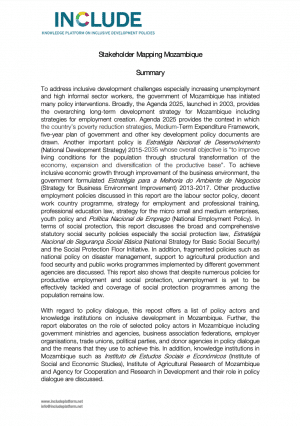
To address inclusive development challenges especially increasing unemployment and high informal sector workers, the government of Mozambique has initiated many policy interventions. Broadly, the Agenda 2025, launched in 2003, provides the overarching long-term development strategy for Mozambique including strategies for employment creation. Agenda 2025 provides the context in which the country’s poverty reduction strategies, Medium-Term Expenditure Framework, five-year plan of government and other key development policy documents are drawn. Another important policy is Estratégia Nacional de Desenvolvimento (National Development Strategy) 2015-2035 whose overall objective is “to improve living conditions for the population through structural transformation of the economy, expansion and diversification of the productive base”.











